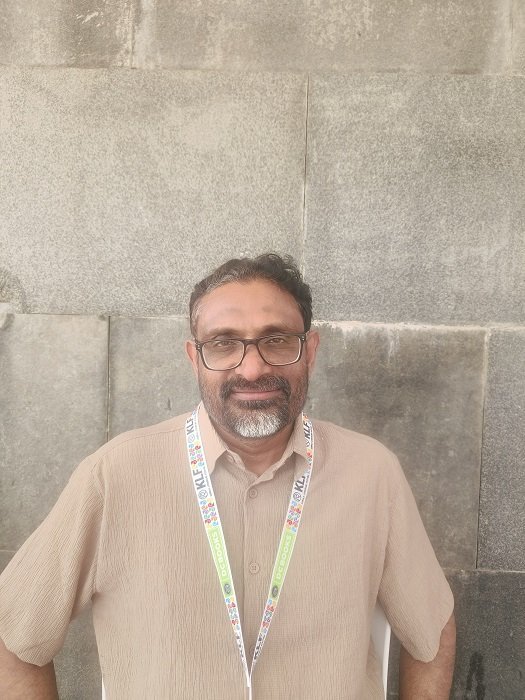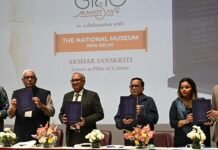Correspondent Priyanka Tanwar spoke with Malayalam writer Benyamin at the Kerala Literature Festival 2025 about his work, Malayalam translations into English, the role of literary festivals and the screen adaptation of his novel Goat Days. Edited excerpts follow.
Indian Printer & Publisher (IPP) – You have written more than 30 books in your writing career. Which one is closest to your heart?
Benyamin – I can’t say which is the most famous or most relatable to the audience. Each book addresses different readers and subjects. If we talk about Aadujeevitham or Goat Days, it addresses people living abroad, it portrays the life of a person who suffered a lot in the desert. In Nishabda Sancharangal, I have written about the journey of nurses from Kerala. Manjaveyil Maranangal or Yellow Lights of Death is one of the more acceptable books of my writing career.
IPP – Several of your works have been translated. How involved are you in the translation process?
Benyamin – I can’t be much involved in translation. I know Malayalam well but I am not well versed in English. I can’t even read or understand other languages. I have to have faith in the translator – this is all I can do as an author.
I don’t interfere with the translations of my books. It’s their (the translators’) job to see how a book will be translated into their language. I give them the freedom to translate at their own pace and understanding.
IPP – You write across multiple forms and genres. Which is your favorite?
Benyamin – I choose new forms for each book. I enjoy writing a new story because repeating the form means I am repeating my writing and myself, which I don’t like. My enjoyment lies in the process of discovering a new form or genre. The form comes along with the subject. I can’t say which form is friendlier or more adjustable. I have written more than 11 novels – each has a different form.
IPP – Which book are you working on right now?
Benyamin – A new novel is being serialized in Mathrubhumi Weekly. The book’s name is Mulberry and it depicts the life of a publisher who has lived in Kozhikode for a long time and published more than 1,000 books in Malayalam. Unfortunately, he commits suicide and leaves everyone blank. Though his life forms the plot, it is a multi-layered novel and may come out as a book in June 2026.
IPP – Goat Days had a screen adaptation. How involved were you with the project?
Benyamin – My involvement was very little because the director wrote the screenplay himself. We discussed certain aspects and I was present during the shoot. I suggested small changes, but on the whole, my involvement was limited. I gave my story and he adapted it to suit the requirements of cinema.
IPP – Your book Jasmine Days won the inaugural JCB Prize for Literature. What role do literary prizes play in promoting translated works?
Benyamin – Earlier, Indian English readers thought Indian English writings were the best writings from India. But now we see that many regional languages have excellent books, maybe better than Indian English writing. When a regional book is translated well and receives a prestigious award, it means it is accepted well by readers and critics. After the award, my books reached many people in India and across the world. People now know that regional books can bring out very strong stories from India. Translations are very important and translated books winning awards means much more appreciation for books coming from India’s regional languages.
IPP – How satisfied were you with the work of Shahnaz Habib in the translation of Jasmine Days? What kind of research went into the translation process?
Benyamin – Shahnaz has translated it very well. Because she lives in New York, and is familiar with international writing and knows how to translate a book from a regional language. When we translate regional languages into English, we need to address international readers.
IPP – Malayalam translations are steadily gaining prominence in India’s translation scene. Your thoughts?
Benyamin – Malayalam literature is going through a brilliant phase. Many books are being translated and readers are realizing the depth and inherent power of Malayalam literature. Translations into English and other languages offer a great opportunity for Malayalam writers to grow.
IPP – What is the future of vernacular Indian translations in the global scenario?
Benyamin – Many books are being translated into English but we still have a long way to go as translations from India’s regional languages are selling mostly in India. Indian regional language translations have to go to the US, and UK and reach other European languages. Only then, can we say Indian language translations have reached world literature. In another 10 or 15 years, we may be able to reach this goal.
IPP – Tell us about your relationship with DC Books as a writer.
Benyamin – From the beginning of my career, I have enjoyed a good connection with DC Books. Almost all of my books are published by DC, though some have been published by others as well. My first novel Abeesagin was published by DC Books.
IPP – Your book Tharakan’s Grandhavari was published by DC Books as a set of 120 individually printed cards that could be read in any order. What are your thoughts on such innovations?
Benyamin – We have so many books with new ideas but experimental novels are very rarely seen in our literature – be it Indian English or Malayalam literature. I tried experimental literature in Tharakan’s Grandhavari with 120 chapters that could be read in any sequence. Usually, the writer decides the sequence of the chapters to be read. However, in this case, the reader decides the sequence. He can shuffle and read the chapters according to his liking and still understand the story. This is the basic idea of the innovation. I feel many more experimental novels should come up.
IPP – Which authors have inspired you as a writer?
Benyamin – Many authors from Malayalam and world literature. The Greek author Nikos Kazantzakis, who has written gems such as Zorba the Greek and The Last Temptation of Christ, is my biggest inspiration. His books are close to my heart.
IPP – How have you evolved as an author?
Benyamin – During my teenage years, I was not into writing. I was not a good reader. When I went to Bahrain at the age of 20, all of it changed. I became a serious reader and over 10 years, I read voraciously. Very soon, I discovered I had a penchant for writing, a capacity to tell stories. I realized there are so many untold stories around me. My journey of becoming a writer was a long process spanning 10 to 15 years.
IPP – How was your experience at the Kerala Literature Festival 2025, since you are a regular here?
Benyamin – So many literature festivals are going on in Kerala. What I like is that they are secular festivals – you mingle and bond over your shared love for literature without any constraints of caste and creed. You communicate and connect with readers and share your ideas and views with other authors.
Secondly, the participants are mostly the younger generation. While one might argue the younger generation is moving away from reading and literature, we see more participation from the young in Kerala’s literature festivals. Literature festivals are encouraging the love for reading and literature among the younger generation and that’s what I love about them.
IPP – Which books, originally written in Malayalam and translated into English, would you recommend to our readers?
Benyamin – It’s difficult to choose. I recommend Moustache by S Hareesh, which has been translated into English by Jayasree Kalathil. It is a JCB Prize-winning novel.

















